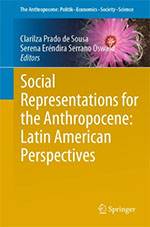APESS
Vol 32 |
Clarilza Prado de Sousa, Serena Eréndira Serrano Oswald (Eds.): – Social Representations for the Anthropocene: Latin American Perspectives (Cham: Springer International Publishing, 2021).
ISBN: 978-3-030-67777-0 (Softcover)
ISBN: 978-3-030-67778-7 (EBook)
Doi: 10.1007/978-3-030-67778-7_ (add chapter no.)
Order this book on Springer Website
|

|
- Addresses the relevance of Social Representations Theory for the Anthropocene
- Contributes to the Social Representations Theory in Latin America
- Presents innovative research and commentaries by established researchers in the field
- Various disciplines in the social sciences and humanities will benefit from this multidisciplinary book
The Anthropocene has become a field of studies in which the influence of human activity on the earth system and nature is both the main threat and the potential solution. Social Representations is a theoretical perspective evolving since the 1960s which links knowledge and practice in everyday life. This book assembles key contributions by Latin American scholars working with social representations in the social sciences that are of conceptual relevance to the study of the Anthropocene and that investigate the societal consequences of complex interrelations between common sense and global environmental change, lived contradictions of sustainable development, construction of risks beyond risk-perception, negotiation and education of governance, the usefulness of longitudinal and systemic ethnography and case studies, agency and the link between inequality, crises and risk society, presenting theoretical and methodological innovations in Spanish, Portuguese and French that have rarely been available in English. |